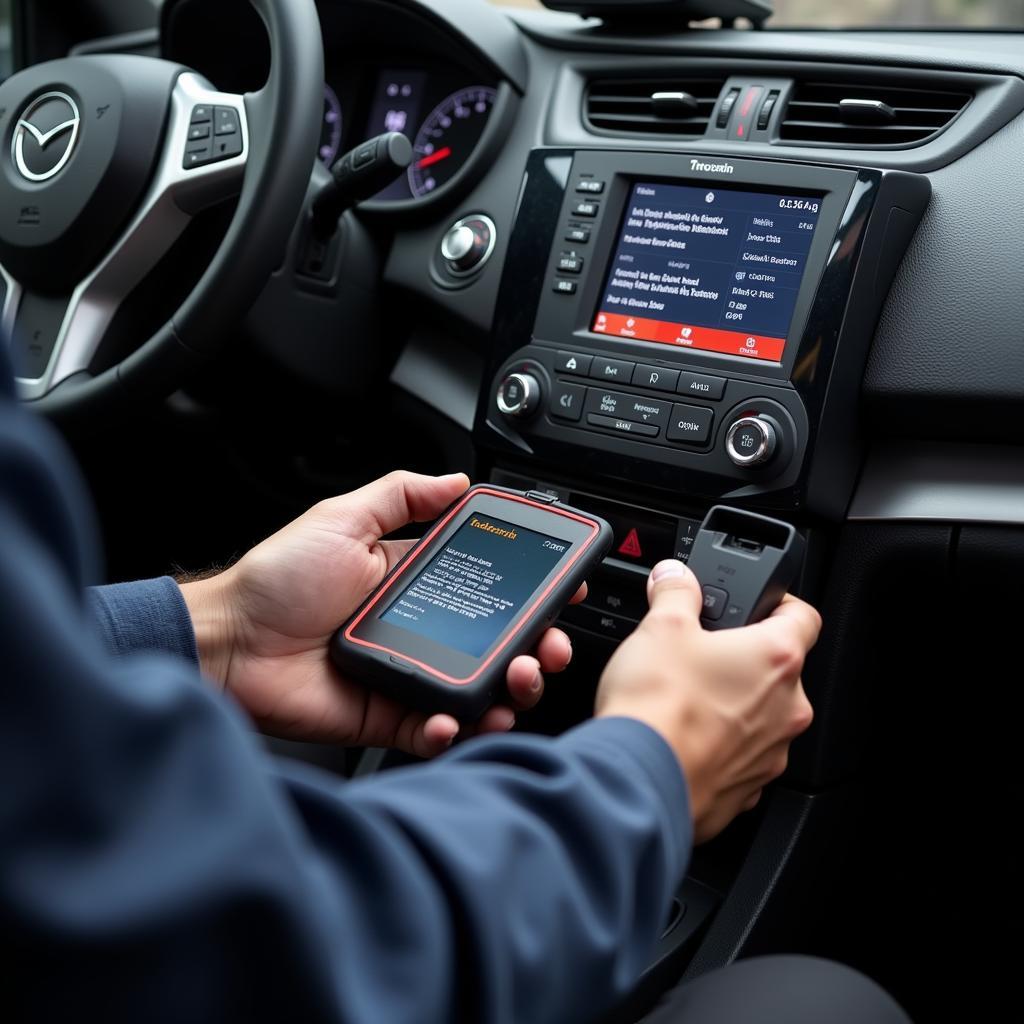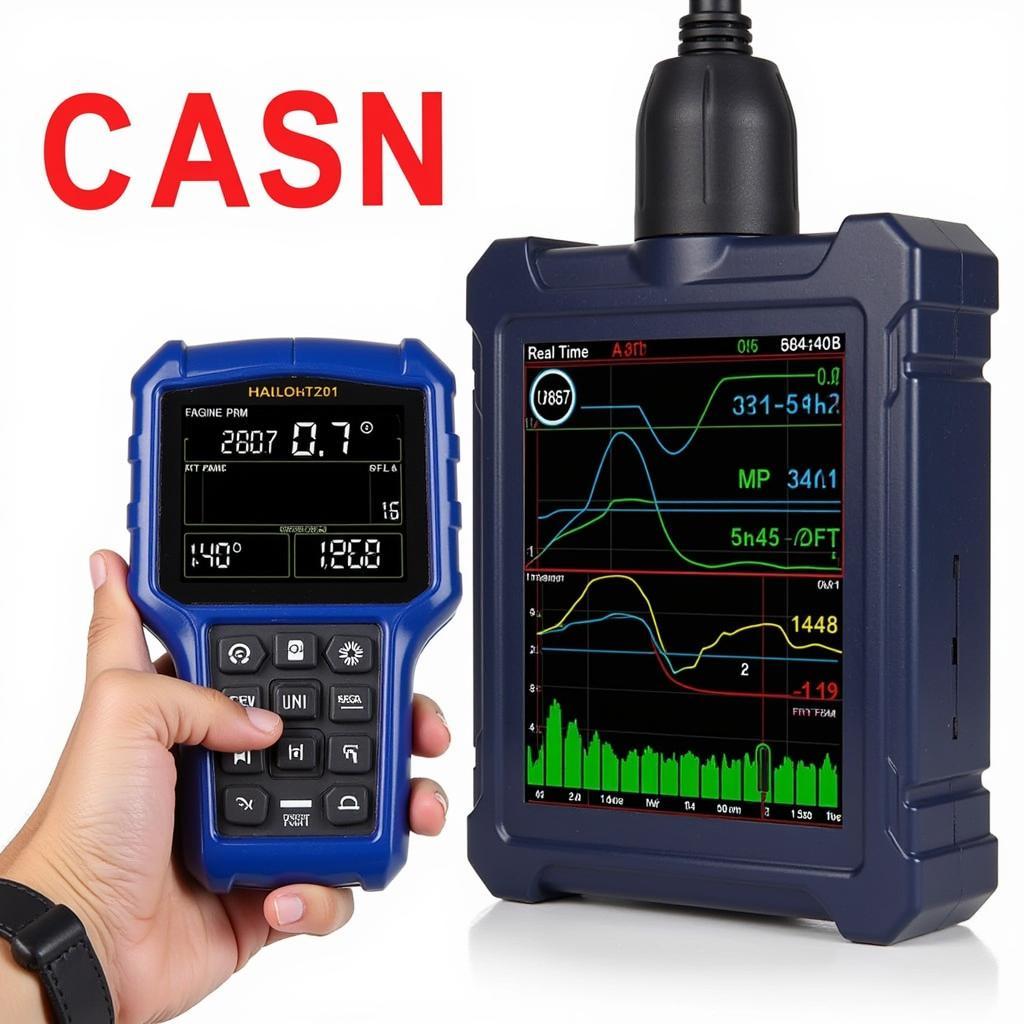In the ever-evolving automotive world, understanding what’s happening under the hood of your car can feel like deciphering ancient hieroglyphics. That’s where a Car Diagnostics Toolkit comes in, empowering you to read those digital hieroglyphs and take control of your car’s health. Whether you’re a seasoned mechanic or a car enthusiast looking to demystify the world of engine codes, a good diagnostics toolkit is an indispensable asset. This comprehensive guide will delve into the world of car diagnostics toolkits, helping you choose the right one for your needs and understand how to use it effectively.
What Exactly is a Car Diagnostics Toolkit?
A car diagnostics toolkit is your window into your car’s computer system. It allows you to communicate with your car’s Electronic Control Unit (ECU), retrieving diagnostic trouble codes (DTCs) that illuminate the “check engine” light and many other warning indicators on your dashboard. Instead of relying on guesswork and potentially costly trips to the mechanic, you can pinpoint problems yourself.
 Mechanic using a car diagnostics toolkit to analyze a vehicle’s ECU
Mechanic using a car diagnostics toolkit to analyze a vehicle’s ECU
Why You Need a Car Diagnostics Toolkit
The benefits of owning a car diagnostics toolkit are plentiful, catering to both casual users and professional mechanics:
- Early Problem Detection: Identify minor issues before they snowball into major (and expensive) repairs.
- Cost Savings: Avoid unnecessary trips to the mechanic for simple diagnostics.
- Increased Knowledge: Gain a deeper understanding of your car’s inner workings.
- Enhanced Control: Make informed decisions about your car’s maintenance.
- DIY Empowerment: Tackle repairs yourself, saving time and money.
Types of Car Diagnostic Toolkits
Choosing the right toolkit depends on your needs and technical expertise. Here’s a breakdown:
1. Basic Code Readers: For the Casual User
These entry-level tools read and clear basic DTCs, providing a starting point for troubleshooting. They are generally affordable and user-friendly, suitable for car owners who want to understand their check engine light.
2. OBD-II Scanners: The Versatile Option
OBD-II scanners offer more advanced features compared to basic code readers. They can access live data streams from your car’s sensors, display vehicle information (VIN, mileage), and graph sensor readings over time.
 A modern OBD-II scanner plugged into a car’s OBD-II port.
A modern OBD-II scanner plugged into a car’s OBD-II port.
3. Professional-Grade Scan Tools: The Mechanic’s Arsenal
Designed for experienced mechanics and workshops, professional scan tools provide comprehensive diagnostic capabilities. They offer advanced features such as bidirectional control (allowing you to actuate components), programming and coding, and access to manufacturer-specific systems.
Choosing the Right Car Diagnostics Toolkit
Consider these factors when making your decision:
- Your Budget: Prices range from affordable basic code readers to high-end professional tools.
- Your Skill Level: Choose a tool that aligns with your technical expertise.
- Your Vehicle: Ensure compatibility with your car’s make, model, and year.
- Features: Determine which features are essential for your needs (e.g., live data, bidirectional control).
Understanding Diagnostic Trouble Codes (DTCs)
DTCs are the language your car’s computer uses to communicate problems. They consist of a five-character alphanumeric code, each character conveying specific information:
- First Character: Indicates the system related to the fault (e.g., “P” for Powertrain, “B” for Body).
- Second Character: Specifies whether the code is generic (0) or manufacturer-specific (1 or more).
- Third Character: Identifies the specific subsystem related to the fault (e.g., “1” for Fuel and Air Metering).
- Fourth and Fifth Characters: Represent the specific fault within the subsystem.
FAQs about Car Diagnostics Toolkits
1. Can I use any car diagnostics toolkit on any car?
Not necessarily. While most modern cars (post-1996) use the OBD-II standard, some vehicles may require manufacturer-specific tools for full functionality.
2. Will a car diagnostics toolkit void my car’s warranty?
No, using a car diagnostics toolkit will not void your warranty. You have the right to access and clear DTCs from your own vehicle.
3. Is it difficult to use a car diagnostics toolkit?
Most car diagnostics toolkits are user-friendly, especially those designed for DIYers. However, it’s essential to consult your vehicle’s repair manual and follow instructions carefully.
Taking Charge of Your Car’s Health
Investing in a car diagnostics toolkit can be one of the smartest decisions you make as a car owner. From identifying minor glitches to tackling repairs head-on, you’ll gain a new level of control and confidence in managing your vehicle’s well-being.
For those seeking even more specialized tools, explore our in-depth guides on car electrical diagnostic tools and diagnostic equipment for cars. Remember, knowledge is power when it comes to keeping your car running smoothly.

Leave a Reply